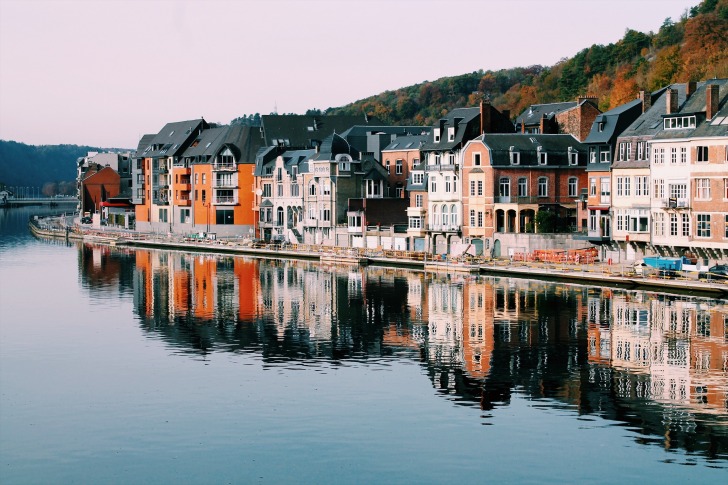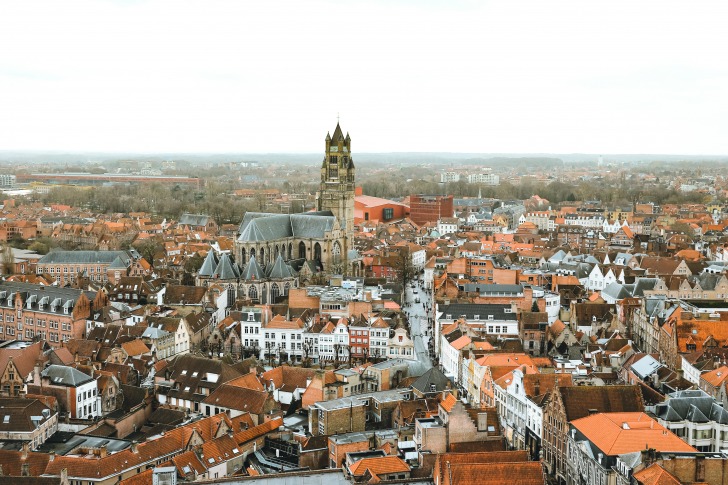If you are considering moving to Belgium, you have many wonderful things in store for you.
The country has a high quality of life, with significant social nets and lots of public amenities.
However, there are also challenges to living in Belgium, just as anywhere else.
If you are thinking about moving to Belgium, here are some of the top pros and cons to consider.

Contents
Pros of Living in Belgium
Want to know more about the benefits of living in Belgium?
These are some of the best reasons to move to the country.
1. There Are Good Job Opportunities
You will find job opportunities of all kinds in Belgium.
This is particularly true in Wallonia.
Job opportunities are available across industries, with both skilled and unskilled labor.
You will also find jobs available for English and French speakers; however, you should bear in mind that if you want to break through a glass ceiling, you will need to speak Flemish as well.
On the other hand, if you’re simply trying to pay your bills, you will have no problem finding a job.
2. Neighborhoods Are Beautiful
Most areas in Belgium are well-maintained and attractive.
You will find clean streets, plenty of public amenities, and safe spaces for everyone.
Belgian communities invest quite a bit of money into making sure their neighborhoods are clean and orderly; the biggest exception is in larger cities such as Brussels, where you will find neighborhoods that are run-down and unsafe.
3. Healthcare Is Excellent
The Belgian healthcare system is one of the best in the world.
You can expect to find excellent care no matter where you go or what type of attention you need.
Belgium also offers a variety of healthcare coverage options, including private insurance through your employer.
The country offers subsidized healthcare, which means that, although treatment is not free of charge, it is substantially lower than what you would find in the United States.
4. Crime Rates Are Low
Crime rates in Belgium are generally low, though this varies depending on where you are.
But even in larger cities such as Brussels, rates of violent crime are low in comparison to other large European cities.
In more rural areas, meanwhile, crime is basically not a concern, and residents live safe lives without worrying about their property or well-being.
The most common crimes in Belgium are pickpocketing and petty theft.
5. Education Is Excellent (And Free!)
No matter whether you’re looking to put your children in Belgian schools or advance your degree at a university, you can find excellent education for free in Belgium.
You may find different offerings depending on which region you want to study in.
The Belgian education system is one of the best in the world, particularly the universities, almost all of which rank internationally in terms of quality.
6. There Is Plenty Of Public Transportation
Public transportation is the norm for getting around in Belgium; roughly 27 percent of households in the country do not own a car.
Instead, many residents rely on trams, trains, and buses, all of which are highly efficient and dependable.
The cost of public transport varies from place to place, but in general, it is highly affordable; there are also options for bus passes for students and other individuals.
7. Housing Is Affordable
Housing in Europe is on average quite expensive, but in comparison, Belgium is quite affordable.
In larger cities such as Brussels and Antwerp, you can depend on paying close to €1,000 a month for rent; however, if you live in a smaller town or village, you may pay considerably less.
Official estimates put housing costs in Belgium at 52 percent of those in the United States and significantly less than the surrounding countries.
8. The Cuisine Is Excellent
It should come as no surprise that you can bet on eating well in Belgium.
Not only is the national cuisine delicious, but the country is also in the center of Europe — which means that you can expect to enjoy influences from France, Germany, Scandinavia, and more.
Depending on where you live, you will also get to eat regional specialties from Wallonian and Flemish cuisines.

Cons of Living in Belgium
Like any other country, there are both positives and negatives to living in Belgium.
Here are a few of the cons you should know before you decide to move there.
1. The Language Situation Is Complicated
Belgium is divided into two distinct regions, Flanders and Wallonia.
Each of these — as well as the capital, Brussels — offers a unique living experience.
They are governed by their own laws, particularly in regard to housing and education, and foreigners sometimes find that moving between them presents a bigger culture shock than they expected.
Depending on where you live in Belgium, you may find yourself expected to make your way by speaking French, Flemish, English, or even German.
2. Cost Of Living Is Expensive
Like many other countries in Europe, the cost of living in Belgium is high.
Food prices, for example, are so expensive that many Belgians actually cross international lines to do their weekly shopping. Utilities can also be quite expensive.
However, many people think that the costs even out, considering the fact that housing and healthcare costs are comparatively low in Belgium.
3. Taxes Are High
Belgium has one of the highest tax rates in the European Union.
You can probably expect to pay between 25 and 50 percent of your income in taxes.
The good news is that these high tax rates go to funding public services such as affordable healthcare, schools, and transportation.
However, it can be difficult for many newcomers to Belgium to get used to handing over such a significant portion of their earnings.
4. There Are Upfront Costs For Healthcare
Belgium’s healthcare system isn’t free.
It is subsidized, so private insurance still very much exists.
Regardless of whether you have insurance through your employer, you can still expect to pay upfront costs when you go to the doctor or the hospital (a general sick visit or checkup runs, on average, about €25).
Then, depending on your insurance status, you may be eligible to get these costs reimbursed.
It is certainly more affordable than healthcare in the US, but some people dislike the long process of paying and being reimbursed for treatment costs.
5. It May Be Difficult To Integrate
Some people find it difficult to integrate into Belgian society.
Belgians can be very reserved, which leads to some ex-pats interpreting them as unwelcoming or cold.
As a result, newcomers to the country sometimes feel isolated.
Sadly, there has been an uptick in recent years in anti-immigrant sentiment, particularly in regard to non-white or non-European immigrants.
Though many Belgians are welcoming to foreigners, this can make some people have a difficult time finding their footing in Belgian society.
6. The Weather Can Be Unpredictable
The weather in Belgium can be notoriously unpredictable.
It isn’t uncommon for the forecast to change wildly multiple times a day, switching from warm and sunny to blustery and rainy.
The good news is that Belgian winters tend to be mild and tolerable, so you won’t be freezing throughout half the year.
However, some people find it difficult to adapt to the constantly-changing weather patterns.
Averages also vary significantly in different regions.
7. Finding a Job As a Foreigner Can Be a Challenge
There are plenty of job openings in Belgium, but newcomers to the country may have a surprisingly hard time finding a place to work.
This is because many jobs in Belgium are limited to residents of the European Union.
Why?
Simply because there are additional costs and processes involved in hiring a non-EU resident.
Don’t be surprised if you have a hard time landing a long-term job before establishing your residency.
8. Belgian Cities Are Crowded
It might come as a surprise in such a small country, but Belgian cities are some of the busiest and most crowded in Europe.
If you are planning on living or working in a larger city such as Brussels or Antwerp, plan on spending a lot of time on your commute.
Brussels is the third most crowded city in both North America and Europe, and studies have estimated that the average resident spends about 134 hours annually stuck in traffic.
Pros and Cons of Living in Belgium – Summary Table
| Pros of Living in Belgium | Cons of Living in Belgium |
|---|---|
| 1. There Are Good Job Opportunities | 1. The Language Situation Is Complicated |
| 2. Neighborhoods Are Beautiful. | 2. Cost Of Living Is Expensive |
| 3. Healthcare Is Excellent | 3. Taxes Are High |
| 4. Crime Rates Are Low | 4. There Are Upfront Costs For Healthcare |
| 5. Education Is Excellent (And Free!) | 5. It May Be Difficult To Integrate |
| 6. There Is Plenty Of Public Transportation | 6. The Weather Can Be Unpredictable |
| 7. Housing Is Affordable | 7. Finding a Job As a Foreigner Can Be a Challenge |
| 8. The Cuisine Is Excellent | 8. Belgian Cities Are Crowded |
Belgium Safety Overview
READ THE FULL REPORT: Belgium Safety Review
Safety Index:
- OVERALL RISK: LOW
- TRANSPORT & TAXIS RISK: MEDIUM
- PICKPOCKETS RISK: MEDIUM
- NATURAL DISASTERS RISK: LOW
- MUGGING RISK: LOW
- TERRORISM RISK: MEDIUM
- SCAMS RISK: LOW
- WOMEN TRAVELERS RISK: LOW
Frequently Asked Questions
How Much Money Do You Need To Live Comfortably In Belgium?
Salaries in Belgium are high, but so is the cost of living.
This varies significantly depending on where you live in the country.
The average salary in Belgium is about €3,758 a month, which comes down to €2,432 after taxes.
This is generally manageable for a single adult living in Belgium.
What Do I Need To Know Before Moving To Belgium?
There are a few key things to know before moving to Belgium.
One of the most important is a bit about how Belgian society works and of course, at least some elementary words in Flemish or French.
What Is Belgium Best Known For?
Belgium is known for many things, perhaps most notably as the “headquarters of the European Union”.
This is due to the fact that it is the site of not just NATO headquarters but also the EU Commission and European Parliament.
Belgium is located in the midst of Europe, making it a perfect jumping-off point for many other European countries.
Can You Live In Belgium Speaking Only English?
Belgium is a multilingual society.
Most natives are highly proficient in English, so as a visitor, you will be able to get around very well with just that language.
However, if you plan to stay and work in the country, you will need to become proficient in one of the major languages of the country — or both.
Most Belgians speak either French or Flemish, with large swathes of the population also speaking German and English.
Is Belgium a Good Place To Live As a Foreigner?
Whether Belgium is a good place to live as a foreigner is largely a matter of opinion.
Some foreigners find Belgian society unfriendly and cold, while others end up finding a comfortable niche in time.
Most Belgians are welcoming to people from other countries, though there has also been a rise in anti-immigrant sentiment in recent years.












Belgium has a high quality of life and offers many wonderful things for those considering a move, but there are also challenges to living there.
Belgium offers a high quality of life with excellent healthcare, education and job opportunities; however, the unpredictable weather, crowded cities and complex language situation can be challenging.